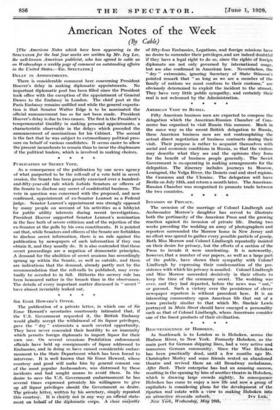PUBLICATION OF SECRET VOTE.
As a consequence of the publication by one news agency of what purported to be the roll-call of a vote held in secret session, the Senate has been greatly exercised over a hundred- and-fifty-year-old rule which forbids Senators or officers of the Senate to disclose any secret of confidential business. The vote in question was concerned with the proposed, and now confirmed, appointment of ex-Senator Lenroot as a Federal judge. Senator Lenroot's appointment was strongly opposed by many people on account of his activities as a lobbyist for public utility interests during recent investigations. President Hoover supported Senator Lemoot's nomination in the face both of severe criticism and of the rejection of the ex-Senator at the polls by his own constituents. It is pointed out that, while Senators and officers of the Senate are forbidden to disclose secret information, there is no rule against the publication by newspapers of such information if they can obtain it, and they usually do. It is also contended that these secret proceedings are a negation of democratic principles. A demand for the abolition Of secret sessions has accordingly sprang up within the Senate, as well as outside, and there are indications that the demand, already partly met by the recommendation that the roll-calls be published, may even- tually be acceded to in full. Hitherto the secrecy rule has been honoured rather in the breach than in the observance. The details of every important matter discussed in " secret " have almost invariably leaked out.
* *










































 Previous page
Previous page